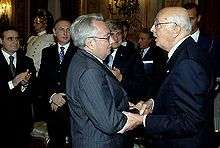Candido Cannavò
Candido Cannavò (Italian pronunciation: [ˈkandido kannaˈvɔ]; 29 November 1930 – 22 February 2009) was an Italian journalist, well known as the historical editor (1983–2002) of the Italian sport newspaper La Gazzetta dello Sport.
Candido Cannavò | |
|---|---|
 Candido Cannavò, left, and president Giorgio Napolitano | |
| Born | 29 November 1930 Catania, Sicily, Italy |
| Died | 22 February 2009 (aged 78) |
| Occupation | Journalist, writer |
| Known for | La Gazzetta dello Sport |
Biography
Cannavò was born in Catania and begun to work as sport journalist for La Sicilia when he was nineteen. He was president of CUS Catania from 1952 until 1955, when he was hired by La Gazzetta dello Sport. In 1981, he became vice-director and, in 1983, director. During his stay, the Gazzetta consolidated as the major Italian sport newspaper; Cannavò also launched the weekly Sportweek and the Gazzetta website.
Cannavò gained national popularity also for his numerous TV appearances in connection with the Giro d'Italia and Serie A football. He continued to write for Gazzetta until two days before his death; he was also author of an autobiography and of essays about social themes, such as Italian prisons, as well as handicapped and homeless people.
He died of cerebral hemorrhage in Milan in 2009, aged 78, and is buried at the city's Monumental Cemetery.
Works
- Una vita in rosa (2002)
- Libertà dietro le sbarre (2004)
- E li chiamano disabili (2005)
- Pretacci. Storie di uomini che portano il Vangelo sul marciapiede (2008)
Gallery
 Cannavò's grave at the Monumental Cemetery of Milan, in 2015
Cannavò's grave at the Monumental Cemetery of Milan, in 2015
Sources
- Obituary at Gazzetta website (in Italian)